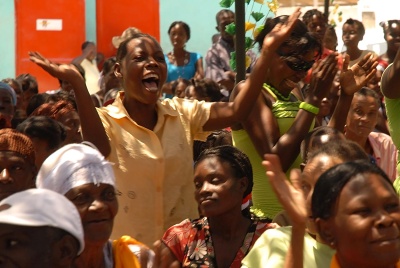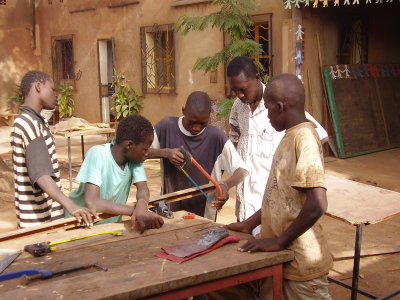Great post today from Duncan Green on his blog which gave me the pleasure to discover Hans Rosling. What a joy to watch. If only all those who presented in seminars and conferences (me included!) could be so entrancing! Rather than being an onerous task we feel compelled to put ourselves through in the hope of retaining one hundredth of what is said, a Rosling lecture is a lesson in communicating ideas.
That said, he is an economist, and as often occurs in this discipline, at times he leaves me a little cold. Watch it and let me know your opinion, but his way of talking about child mortality is unpleasantly unemotional at times.
In any case, happy watching and learning!
Tuesday, July 20, 2010
Wednesday, July 14, 2010
Supporting and not undermining community solidarity
One of the pleasures of working at the headquarters of an international organisation is that you frequently meet people from, or living in, the world over. Today, I had the opportunity to spend time with a colleague based in Ougadougou in Burkina Faso.
One thing that struck me was the delicate balance to be achieved between developing a project with families living in extreme poverty and not upsetting the community solidarity that is the social fabric of Burkinabé society. For example, a family receives a micro-grant from a foregin NGO that they may use to buy a bicycle, for example, with the overall goal of generating income. If they fail to prosper as a result of the grant, the next time they are in need of community support, they may face a negative reaction: "You asked les blancs for help but you still didn't manage. Now it's your problem." (If you read French, then see this excellent blog post about solidarity networks in Burkina Faso).
All the more important then for projects to be developed in partnership with those who are too often seen crudely as "beneficiaries". This may take over a year to develop to ensure the conditions of trust are in place that will respect family and community ties. In the example shared by my colleague, a relationship is built up,using books and story-telling as a medium, with a young person, part of a group of youths living in the street in the city. He is invited with others to participate in skill-sharing activities - the “Courtyard of 100 Trades” - a workshop to introduce the youngsters to certain trades. The relationship ultimately leads on to a dialogue with the children’s families, as frequently young people will express a desire to return to their community . The aim at this point is to initiate and support plans for a shared future for the young person and their family. A dialogue is facilitated with the family over the space of several months to understand the support the direct and extended family can offer to ensure the young person's return is a success. In such circumstances, where the family and community dynamic has been understood, the conditions are created for a micro-grant to be made that compliment, rather than replace community solidarity.
And what's more, supporting a young person to return to his community is in harmony with traditional values. As the Mossi saying goes, "You must travel to know the elephant, but then return to explain what it is like."
Photo: ATD Fourth World
One thing that struck me was the delicate balance to be achieved between developing a project with families living in extreme poverty and not upsetting the community solidarity that is the social fabric of Burkinabé society. For example, a family receives a micro-grant from a foregin NGO that they may use to buy a bicycle, for example, with the overall goal of generating income. If they fail to prosper as a result of the grant, the next time they are in need of community support, they may face a negative reaction: "You asked les blancs for help but you still didn't manage. Now it's your problem." (If you read French, then see this excellent blog post about solidarity networks in Burkina Faso).
All the more important then for projects to be developed in partnership with those who are too often seen crudely as "beneficiaries". This may take over a year to develop to ensure the conditions of trust are in place that will respect family and community ties. In the example shared by my colleague, a relationship is built up,using books and story-telling as a medium, with a young person, part of a group of youths living in the street in the city. He is invited with others to participate in skill-sharing activities - the “Courtyard of 100 Trades” - a workshop to introduce the youngsters to certain trades. The relationship ultimately leads on to a dialogue with the children’s families, as frequently young people will express a desire to return to their community . The aim at this point is to initiate and support plans for a shared future for the young person and their family. A dialogue is facilitated with the family over the space of several months to understand the support the direct and extended family can offer to ensure the young person's return is a success. In such circumstances, where the family and community dynamic has been understood, the conditions are created for a micro-grant to be made that compliment, rather than replace community solidarity.
And what's more, supporting a young person to return to his community is in harmony with traditional values. As the Mossi saying goes, "You must travel to know the elephant, but then return to explain what it is like."
Photo: ATD Fourth World
Monday, July 5, 2010
Communicating
This week I will be taking part in an internal training session on communication. In order to introduce ourselves to the other participants, everyone has been asked to use something other than a first-person verbal presentation.
That gave me the idea to ask my most loyal and ardent fans - my kids - to describe who I am. You'll find the result below!
That gave me the idea to ask my most loyal and ardent fans - my kids - to describe who I am. You'll find the result below!
Friday, July 2, 2010
There's more to Haiti than the US Military
I just came across this short documentary from US National Public Radio about issues concerning food aid and its effects on the local economy.
It's an intersting piece but it left me thinking: what's the decision-making role of Haitians in the reconstruction of their country? The US Military is rebuilding the port, the World Food Programme is responsible for decisions concerning food aid. Is it uniquely foreigners who are taking action to get the country back on its feet? Again forgotten are the daily efforts of the Haitian people for daily life not simply to return to normal, but to build a more country more inclusive and equal than before.
 It's another missed opportunity by the media to show that the Haitians are not passive in the wake of the tragedy that befell their country. On the contrary, they seek ways to show their solidarity with their fellow citizens. The organisation I work for bears witness to this, with numerous young people from the community in the Grand Ravine area in which the run projects offering their time to volunteer to support the more disadvantaged members of their community. Their local knowledge has been particularly vital in ensuring that the most isolated and excluded people in the neighbourhood are aware of programmes such as the "cash for work" initiative.
It's another missed opportunity by the media to show that the Haitians are not passive in the wake of the tragedy that befell their country. On the contrary, they seek ways to show their solidarity with their fellow citizens. The organisation I work for bears witness to this, with numerous young people from the community in the Grand Ravine area in which the run projects offering their time to volunteer to support the more disadvantaged members of their community. Their local knowledge has been particularly vital in ensuring that the most isolated and excluded people in the neighbourhood are aware of programmes such as the "cash for work" initiative.
So a plea to the media: focus on the large-scale efforts undertaken by the UN, US Military and the like, but also put the spotlight on the more conspicuous, yet in many ways more far-reaching, undertakings of Haitians to ensure none of their citizens remain left behind.
(Photo: ATD Fourth World)
It's an intersting piece but it left me thinking: what's the decision-making role of Haitians in the reconstruction of their country? The US Military is rebuilding the port, the World Food Programme is responsible for decisions concerning food aid. Is it uniquely foreigners who are taking action to get the country back on its feet? Again forgotten are the daily efforts of the Haitian people for daily life not simply to return to normal, but to build a more country more inclusive and equal than before.
 It's another missed opportunity by the media to show that the Haitians are not passive in the wake of the tragedy that befell their country. On the contrary, they seek ways to show their solidarity with their fellow citizens. The organisation I work for bears witness to this, with numerous young people from the community in the Grand Ravine area in which the run projects offering their time to volunteer to support the more disadvantaged members of their community. Their local knowledge has been particularly vital in ensuring that the most isolated and excluded people in the neighbourhood are aware of programmes such as the "cash for work" initiative.
It's another missed opportunity by the media to show that the Haitians are not passive in the wake of the tragedy that befell their country. On the contrary, they seek ways to show their solidarity with their fellow citizens. The organisation I work for bears witness to this, with numerous young people from the community in the Grand Ravine area in which the run projects offering their time to volunteer to support the more disadvantaged members of their community. Their local knowledge has been particularly vital in ensuring that the most isolated and excluded people in the neighbourhood are aware of programmes such as the "cash for work" initiative.So a plea to the media: focus on the large-scale efforts undertaken by the UN, US Military and the like, but also put the spotlight on the more conspicuous, yet in many ways more far-reaching, undertakings of Haitians to ensure none of their citizens remain left behind.
(Photo: ATD Fourth World)
Subscribe to:
Posts (Atom)

